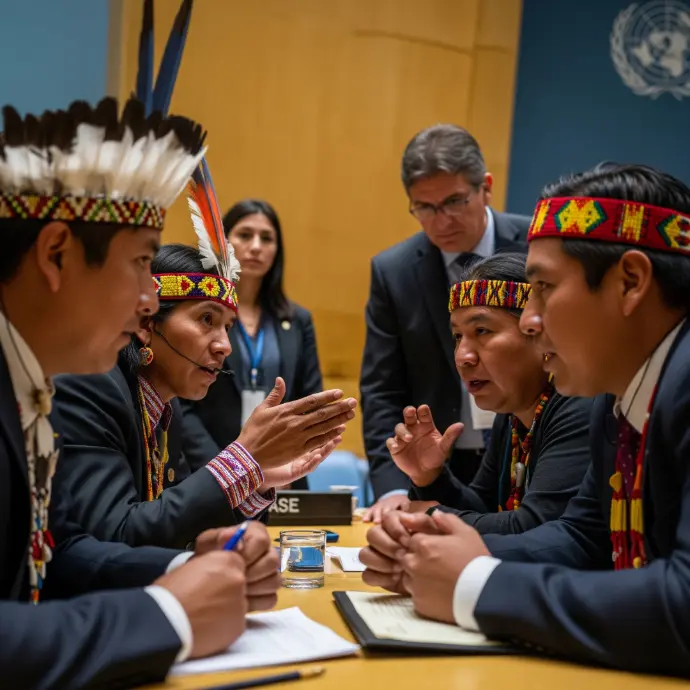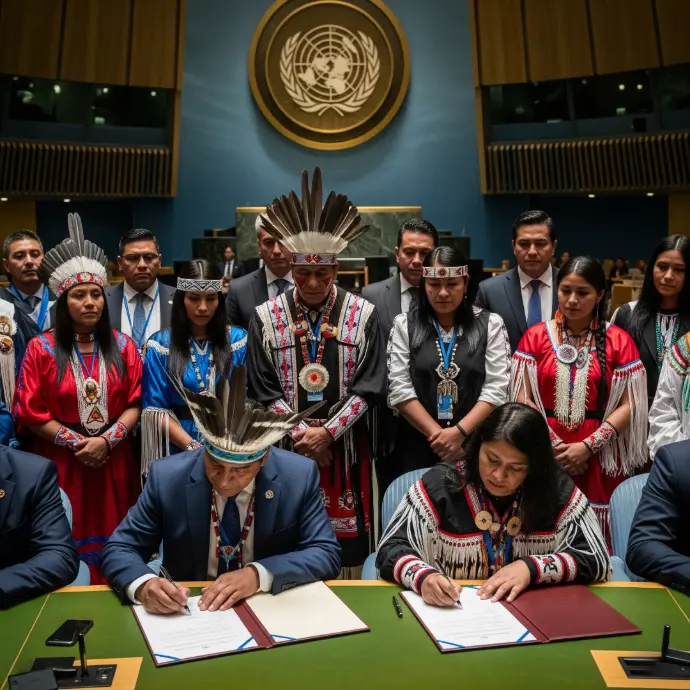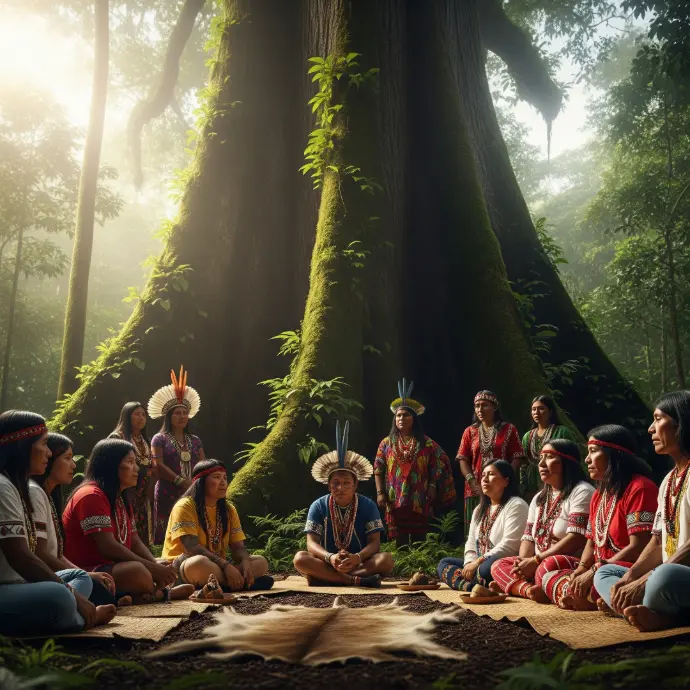Historic International Treaties and Their Impact on Indigenous Peoples Today
Discover how international treaties have influenced the rights of indigenous peoples in our feature article: "Historic International Treaties and Their Impact on Indigenous Peoples Today." We invite you to explore, learn, and reflect with us!
Introduction to International Treaties and Indigenous Peoples
International treaties play a crucial role in defending the rights of indigenous peoples by establishing rules and responsibilities for countries in relation to these groups. These are official agreements between nations that seek to regulate various issues, such as human rights, environmental protection, and in this case, the rights of indigenous peoples.
The importance of these treaties for indigenous peoples is that they are a valuable legal tool that ensures the respect and promotion of their rights. These global conventions often recognize the need to protect the cultures, territories, and lifestyles of indigenous peoples, in addition to safeguarding them against discrimination, violence, and exploitation.
Additionally, international treaties can also help increase the participation of Indigenous peoples in decisions that impact their communities by promoting prior and informed consultation on issues that directly affect them. Thus, these agreements are essential for advancing the defense and recognition of Indigenous peoples' rights worldwide.
The origin of international treaties with Indigenous peoples dates back many centuries, when European colonial powers signed agreements with various Indigenous communities in the Americas, Africa, Asia, and Oceania. In many cases, these treaties were used to justify the occupation of Indigenous lands, the imposition of governments, and the exploitation of natural resources.
Over time, the relationship between States and Indigenous peoples has changed, leading to the creation of more equitable international treaties that seek to protect the rights and autonomy of these communities. Important examples of international treaties with Indigenous peoples are the United Nations Declaration on the Rights of Indigenous Peoples and Convention 169 of the International Labor Organization (ILO).
These agreements have been essential in promoting self-determination, the conservation of Indigenous cultures, the right to land and natural resources, and combating the discrimination and exclusion that Indigenous peoples have historically suffered globally. Despite progress, challenges remain in the effective implementation of these agreements and in the full protection of Indigenous peoples' rights worldwide.
The Impact of the Treaty of Guadalupe Hidalgo on Native Peoples
On February 2, 1848, the Treaty of Guadalupe Hidalgo was signed, ending the Mexican-American War. This agreement resulted in the surrender of Mexican territories to the United States, significantly impacting Native communities in the area. During the conflict, Indigenous peoples' lands became a battleground, leading to forced displacements that profoundly altered their traditional customs.
The treaty established the dividing line between Mexico and the United States along the Rio Grande and Rio Bravo rivers, which meant that Mexico lost large swathes of territory, including areas where Indigenous communities lived. This loss of territory led to the fragmentation of Indigenous lands and the creation of new borders that impacted their migration patterns, cultural exchange, and their ties with other communities.
Furthermore, the Treaty of Guadalupe Hidalgo did not incorporate clear measures to safeguard the rights of Indigenous peoples located in the affected areas, increasing their vulnerability to the colonization and cultural assimilation promoted by the new governments.
The long-term repercussions of the Treaty of Guadalupe Hidalgo on Indigenous communities in Mexico and the United States have been profound and persistent. In Mexico, land loss resulted in the expulsion of several Indigenous communities from their ancestral lands, causing mass displacement, loss of cultural identity, and land disputes that continue today.
In the United States, the acquisition of new territories following the treaty led to the implementation of new laws and policies that further reduced the autonomy of Indigenous communities. The pressure for cultural assimilation and the loss of land continued to weaken the rights and integrity of these peoples, setting a bad precedent for future infringements of their territorial and cultural rights.
Today, Indigenous communities in both Mexico and the United States continue to fight for recognition of their land rights, as well as their cultural and linguistic rights. They also face challenges such as the exploitation of natural resources in their territories, lack of access to essential services, and social discrimination. The legacy of the Treaty of Guadalupe Hidalgo is evident in the current struggles of Indigenous peoples to protect their rights and keep their ancestral traditions alive.
The Treaty of Waitangi and Its Impact on Māori in New Zealand
The Treaty of Waitangi, which was signed in 1840 in New Zealand between representatives of the British Crown and Māori leaders, is a key document in the country's history and in the relationship between Māori and the government. This treaty was intended to create a peaceful and cooperative relationship between both parties, recognizing Māori control over their lands and ensuring their rights as citizens.
The Treaty of Waitangi includes several fundamental principles, such as recognition of Māori control over their lands and resources, guaranteeing the protection of their rights, and equal rights between Māori and British settlers. This agreement laid the foundation for harmonious coexistence and mutual respect between the two cultures in New Zealand. Although the Treaty of Waitangi has had various interpretations throughout its history, its relevance stems from its role as a legal instrument that secures the rights of Māori and establishes a path toward reconciliation and recognition of Indigenous culture within New Zealand society.
The relevance of the Treaty of Waitangi for Māori in New Zealand remains significant today. For several years, Māori have worked to have their rights recognized and the principles included in the treaty effectively implemented, particularly in relation to land and natural resource management.
Due to pressure and organizing from the Māori community, important achievements have been made in terms of autonomy and self-governance, including the creation of entities and organizations that defend Māori interests in various areas, such as health, education, and justice.
Despite the challenges and tensions that remain in the implementation of the Treaty of Waitangi, its legacy lives on in the fight for equality, justice, and respect for cultural diversity in New Zealand, highlighting the importance of international treaties in protecting the rights of Indigenous peoples.
ILO Convention 169 on Indigenous and Tribal Peoples
International Labor Organization (ILO) Convention 169 is a global agreement that aims to safeguard the rights of indigenous and tribal peoples around the world. It was adopted in 1989 and is the only binding international agreement designed specifically for these communities. One of the main objectives of Convention 169 is to promote the recognition of the identity, culture, traditions, and lifestyles of indigenous peoples, as well as to ensure their inclusion in decisions that affect them.
The key principles of Convention 169 include appreciation for cultural diversity, free and informed consent regarding actions that may impact indigenous communities, the safeguarding of their territories and natural resources, and the promotion of equality and non-discrimination. These principles aim to ensure that the rights of indigenous peoples are respected and protected in all spheres of life.
Convention 169 aims to ensure that the rights of indigenous peoples are recognized, protected, and promoted at all levels.
In Latin America, ILO Convention 169 has profoundly influenced the defense of the rights of indigenous peoples. Several countries in the region have ratified this treaty and have made efforts to integrate its standards into their national laws. Thanks to Convention 169, mechanisms have been created to ensure the participation of indigenous peoples in decision-making that affects them, as well as the protection of their lands and natural resources.
A notable aspect of the implementation of Convention 169 in Latin America has been the recognition of the right to free, prior, and informed consultation as an essential right of indigenous communities. This right establishes that States must conduct meaningful consultations with indigenous communities before taking measures that could impact their rights and territories. Thanks to this legislation, Indigenous peoples have been able to influence decisions involving extractive projects, infrastructure, and public policies that directly affect their lives.
Furthermore, Convention 169 has helped raise the profile of Indigenous peoples' demands and struggles internationally, promoting their recognition as key players in the defense of the environment, biodiversity, and cultural heritage. Despite the progress made, challenges remain in the full implementation of Convention 169 in the region, particularly in relation to land titling, violence against Indigenous leaders, and the guarantee of their political and social rights.
Current Challenges in the Implementation of International Treaties
One of the most significant challenges facing Indigenous communities today is the battle for recognition and proper enforcement of international treaties that defend their rights. Over time, many treaties have been established to ensure the protection of these communities, but on numerous occasions, these agreements have not been properly implemented.
Despite the existence of international treaties that should safeguard their rights, Indigenous communities continue to suffer violations of their territorial, cultural, and environmental rights. The failure to comply with these agreements has led to conflicts and tensions in various regions of the world, where Indigenous communities fight to defend their rights and maintain their traditions and ways of life.
It is essential that governments and international organizations collaborate with Indigenous communities to ensure respect for and effective enforcement of international treaties, thus ensuring that the rights of these groups are protected and respected in practice, not just in theory.
Despite the difficulties they face, there are successful situations in which international treaties have benefited the protection of the rights of indigenous communities. For example, the United Nations Declaration on the Rights of Indigenous Peoples has been a key tool in raising awareness of the needs of these communities and fostering their involvement in decisions that concern them.
However, there are still opportunities to improve the implementation of international treaties in favor of indigenous communities. It is crucial to strengthen the mechanisms that allow for the monitoring and follow-up of these agreements and ensure that indigenous communities actively participate in the implementation and evaluation of public policies.
To have a real impact on the protection of the rights of these communities, it is vital that States and the international community intensify their efforts to fulfill the commitments established in international treaties and collaborate with indigenous communities to ensure their well-being and sustainable development.
Global Initiatives and Movements for the Protection of Indigenous Rights
The United Nations (UN) has been key in the fight for the rights of indigenous peoples around the world. The United Nations Declaration on the Rights of Indigenous Peoples, adopted in 2007, recognizes the need to safeguard and promote the cultural, territorial, and social rights of these communities.
The UN has also created the Permanent Forum on Indigenous Issues, a consultative body that meets annually to discuss issues important to indigenous peoples and promote the implementation of policies that protect their rights. This forum has highlighted the problems faced by indigenous communities and has fostered communication between governments, indigenous organizations, and civil society.
Thanks to the actions of the UN and its agencies, programs and projects have been implemented that promote the participation of indigenous peoples in decisions that affect them, as well as the protection of their ancestral lands and the preservation of their cultural traditions. However, despite these achievements, significant challenges remain in achieving full respect for indigenous rights worldwide.
Several international efforts have had a positive impact on the defense of indigenous peoples' rights. One example is Convention 169 of the International Labor Organization (ILO), adopted in 1989, which is an important instrument that recognizes the rights of indigenous and tribal peoples to self-determination, to their territories, and to prior consultation.
Another significant initiative is the Fund for the Development of Indigenous Peoples of Latin America and the Caribbean (FILAC), which supports community projects led by indigenous peoples in the region. This fund has helped strengthen the autonomy of indigenous communities, encourage the revitalization of their languages and cultures, and improve their living conditions.
Additionally, the creation of the UN Expert Mechanism on the Rights of Indigenous Peoples has facilitated progress in defending the human rights of these populations, providing expert advice and promoting policies that are inclusive and respectful of cultural diversity.
Conclusions and Way Forward for the Protection of the Rights of Indigenous Peoples
International agreements have been essential in the development of the rights of indigenous peoples over time. These agreements have laid the groundwork for the recognition and protection of their rights, promoting self-determination, the preservation of their cultures and lands, and their involvement in decisions that affect them. However, despite the achievements, challenges remain that require urgent attention and action.
It is vital to reflect on the progress made and the difficulties that remain in the effective implementation of international treaties that benefit indigenous peoples. Lack of compliance, discrimination, violence, and violations of rights continue to affect these communities around the world. It is essential to intensify efforts to ensure that treaties translate into real and significant changes in the lives of indigenous peoples. Cooperation between governments, Indigenous organizations, civil society, and the private sector is key to addressing the remaining challenges and moving toward the full protection of Indigenous peoples' rights. It is necessary to strengthen the monitoring, implementation, and follow-up systems for international treaties, as well as to promote the active and meaningful participation of Indigenous peoples at all levels of decision-making.
The progress made in defending Indigenous peoples' rights through international treaties cannot be denied; however, the problems that remain require urgent and coordinated action. It is crucial to ensure that treaties are effectively implemented and that Indigenous peoples' rights are respected in all spheres of life.
The struggle for justice, equality, and respect for the cultural diversity of Indigenous peoples must remain a priority on the global agenda. Only through sincere commitment and tangible actions can we progress toward a world where the rights of all people, including Indigenous peoples, are fully respected and protected.
It is everyone's responsibility to unite to overcome the obstacles that still prevent the full realization of the rights of Indigenous peoples. Only in this way can we build a more just, inclusive, and respectful future for cultural diversity and the dignity of all human beings.
Education and global awareness are essential to safeguarding the rights of Indigenous communities. It is important to promote education that is inclusive and values cultural diversity, promoting understanding and appreciation of Indigenous peoples' worldviews and customs.
Global awareness means understanding that all human beings are connected and that it is vital to respect and defend cultural diversity and the rights of every person. Only through global awareness based on respect, compassion, and collaboration can we create a more just and equitable world for all, including Indigenous communities.
Education and global awareness are effective tools to combat discrimination, exclusion, and violence against Indigenous communities. By fostering mutual understanding, cultural exchange, and appreciation for diversity, we can build a future where the rights of Indigenous peoples around the world are fully recognized and respected.

 IHRO NEWS
IHRO NEWS

